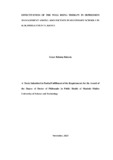EFFECTIVENESS OF THE WELL BEING THERAPY IN DEPRESSION MANAGEMENT AMONG ADOLESCENTS IN SECONDARY SCHOOLS IN KAKAMEGA COUNTY, KENYA
Abstract
Depression is the third leading serious public health problem for adolescents. It is also the second leading cause of death among this population. Well-Being Therapy (WBT) is a psychotherapy that improves optimal psychological well-being. It has effectively managed mental disorders in comparison to other therapies but more effectiveness studies are needed. Broadly, the study determined the effectiveness of WBT in depression management among adolescents in secondary schools in Kakamega County, Kenya. Specifically, the study determined the prevalence, risk factors, strategies for managing depression, and the effectiveness of the WBT. The study was guided by Hopelessness Theory of Depression and the Dynamic Equilibrium Theory. It adopted an experimental design with mixed methods. Tools for adolescents were Kutcher Adolescent Depression Scale-11, Socio-demographic Questionnaire, Psychological Well Being Scale-18. A teacher’s questionnaire was used. Key informant guide was for 12 Sub-County Medical and 12 Education officers. Sampling of 411 adolescents for pretest was done by G-power, and for the posttest, 182 were included. 42 Schools were sampled through multi-stage cluster sampling, while teachers, education officers and medical officers were purposively sampled. Descriptive and inferential analysis was done. Ethical review was from the Masinde Muliro University of Science and Technology Institutional Ethics and Review Committee. Prevalence of depression was 44.8%. Risk factors were being orphaned, poverty, access to mobile phones, having anxiety and HIV. Findings from the adolescents (n=411, 100%) reveal that guidance and counselling and life skills education (n= 325, 79%) are the main methods used. Findings further revealed that only 1% use anti-depressants. WBT was more effective than G&C as depression mean were significantly lower at post-test for adolescents who received WBT (mean 13.8, SD=3.6, p<0.001) than G&C (Mean 21.0, SD=6.6, p<0.001). WBT and G&C showed differences in psychological well-being scores at pretest-post-test, although there was increased significant difference in the PWB mean of pretest-post-test for the adolescents who received WBT (mean 51.3 SD=6.7 and 79.5 SD=8.2; <0.001) than for adolescents who received G&C (mean 50; SD= 6.3 and mean 59.6 SD 8.3; p<0.001 respectively. For the effect size test for non-depressive symptoms, adolescents in WBT were favored significantly (Hedge g=0.9 (0.53-1.52), overall effect size Z=1.26; p=0.05). Post-tests showed that when psychological well-being increases depression decreases. The study recommends a longitudinal study to determine changes in the prevalence of depression among adolescents in secondary schools. Furthermore, there is need for frequent screening of depression among adolescents with the anxiety, HIV, diabetes, respiratory diseases for detection and action. The study recommends that the Ministry of Education may include a policy statement on the use of WBT in depression management among adolescents.

